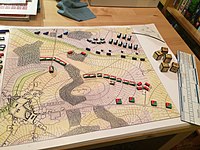
Back لعبة حربية Arabic Joc de guerra Catalan Válečná hra Czech Konfliktsimulation (Brettspiel) German Juego de guerra Spanish Gerra-joko Basque بازیجنگ Persian Sotapeli Finnish Jeu de guerre French משחק מלחמה (משחק אסטרטגיה) HE

| Part of a series on |
| Wargames |
|---|
 |
A wargame is a strategy game in which two or more players command opposing armed forces in a simulation of an armed conflict.[1] Wargaming may be played for recreation, to train military officers in the art of strategic thinking, or to study the nature of potential conflicts. Many wargames re-create specific historic battles, and can cover either whole wars, or any campaigns, battles, or lower-level engagements within them. Many simulate land combat, but there are wargames for naval and air combat, as well.
Generally, activities where the participants actually perform mock combat actions (e.g. friendly warships firing dummy rounds at each other) are not considered wargames. Some writers may refer to a military's field training exercises as "live wargames", but certain institutions such as the US Navy do not accept this.[2] Likewise, activities like capture the flag and paintball are classified as physical sports. Wargaming is a mind sport.
Modern wargaming was invented in Prussia in the early 19th-century, and eventually the Prussian military adopted wargaming as a tool for training their officers and developing doctrine. After Prussia defeated France in the Franco-Prussian War, wargaming was widely adopted by military officers in other countries. Civilian enthusiasts also played wargames for fun, but this was a niche hobby until the development of consumer electronic wargames in the 1990s.
- ^ Dunnigan (1992), The Complete Wargames Handbook, p. 13: "To be a wargame, in our sense of the word, the game must be realistic."
- ^ War Gamer's Handbook (US Naval War College), p. 4: "The [U.S. Naval War College's War Gaming Department] uses the Perla (1990) definition, which describes war gaming as "...a warfare model or simulation whose operation does not involve the activities of actual military forces, and whose sequence of events affects and is, in turn, affected by the decisions made by players representing the opposing sides" (Perla, 1990, p. 164). By doing so, this differentiates a war game from a training exercise, which uses real forces."
© MMXXIII Rich X Search. We shall prevail. All rights reserved. Rich X Search